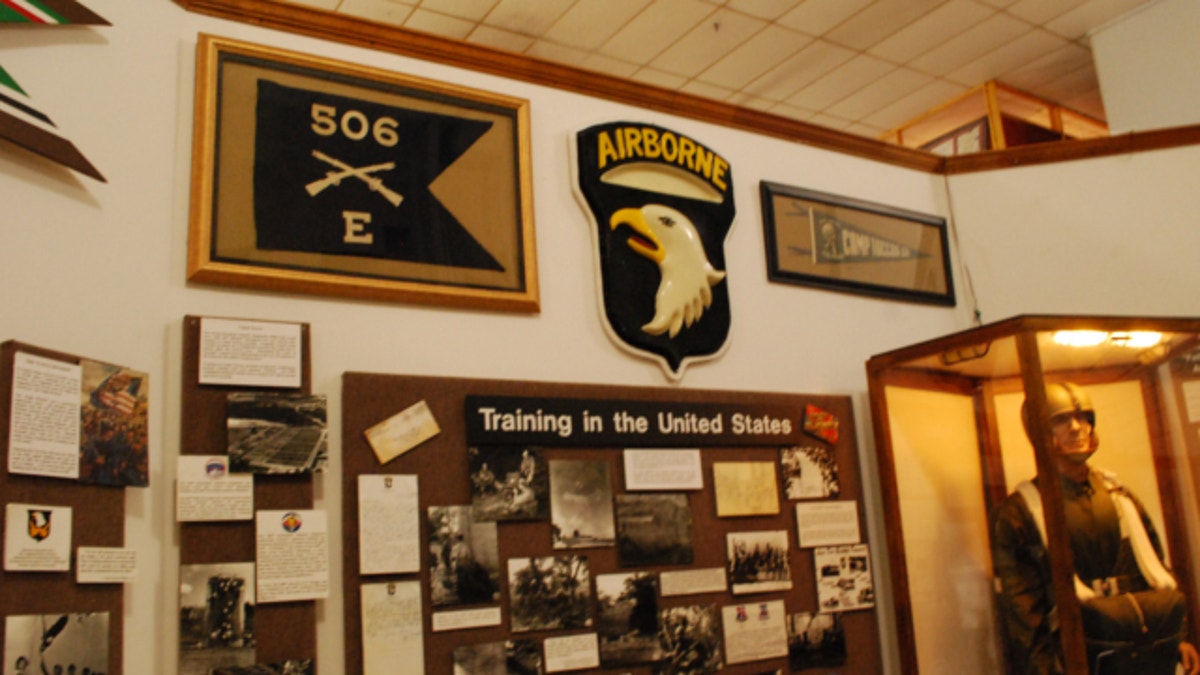
June 27, 2013: The flag of Easy Company, 506th Parachute Infantry Regiment, who were made famous as the "Band of Brothers" in World War II, is seen on a wall inside the museum at Fort Campbell, Ky. (AP)
FORT CAMPBELL, Ky. – The 101st Airborne Division is trying to save its illustrious 506th Infantry Regiment, whose origins date to World War II's fabled "Band of Brothers," from deactivation under the Army's massive restructuring.
The Army announced this week that at least 12 combat brigades nationwide are to be eliminated by 2017 under sweeping military reductions, among them the 4th Brigade Combat Team at Fort Campbell, Ky.
The long-term reorganization seeks to reduce the Army's size from a high of about 570,000 members at the peak of the Iraq war to 490,000 to shrink spending and reflect the country's current military needs as wars in Iraq and Afghanistan end.
The brigade traces its lineage to the 506th Parachute Infantry Regiment, created in 1942.
The 506th was among several parachute regiments created to sneak behind enemy lines in the war. Nicknamed "Currahee," which is a Native American Cherokee term for "stands alone," the regiment parachuted into Normandy during the D-Day invasion in 1944. The regiment raced to liberate Europe amid bouts of fierce fighting in Bastogne, Belgium and then overran Hitler's famed "Eagle's Nest" in Germany.
The "Band of Brothers" book by historian Stephen Ambrose and the subsequent HBO miniseries about the men of Easy Company won national acclaim, propelling the unit to wide fame among the public. The 2001 miniseries was produced by Steven Spielberg and Tom Hanks and followed the soldiers from paratrooper training through D-Day and the end of the war.
Brig. Gen. Mark Stammer, acting senior commander of the 101st Airborne Division, said the division wants to preserve the regiment's two battalions, along with its flags and its historical legacy.
He said during a news conference on Thursday at the post on the Tennessee-Kentucky state line that the regiment's battalions should be transferred to two of the division's three remaining infantry brigades.
The Army's restructuring plan also calls for adding an additional battalion, which is between 600-800 soldiers, to its remaining infantry and armor brigades. Adding the battalion was a recommendation from commanders in Iraq and Afghanistan who said it would beef up the fighting capabilities of the brigades when they go to war.
If Washington's defense and budget planners approve of such a plan, he said "the 506th will live, but it will just live in another brigade combat team."
Following World War II, the regiment was deactivated and reactivated a number of times in its history and moved to other locations as the Army reorganized in the post-war era.
The 506th deployed to the Vietnam War for four years, winning a presidential unit citation for their actions in the A Shau Valley. The regiment's soldiers served in Iraq for a 2004-2005 stint before the regiment returned to Iraq from late 2005 through 2007 in Baghdad as the new 4th Brigade Combat Team under the 101st Airborne Division. The 4th Brigade is currently on its third deployment to Afghanistan.
John O'Brien, the installation historian at Fort Campbell, said the regimental flag with its battle streamers carries the history of the unit, marking the battles and campaigns from World War II to recent times. If the 1st Battalion, 506th Infantry Regiment were moved to a new unit, that regimental flag would continue to fly, he said.
"History, heritage and values ... those things provide the glue that holds the unit together," O'Brien said. "You can imagine how powerful it is to say, `I am a member of the Band of Brothers."'
Jim Martin is one of the few surviving World War II veterans from the original 506th regiment. At 92, he just returned from a trip to Europe to visit locations, including the coast of France, where he and fellow soldiers fought.
Martin, who lives near Dayton, Ohio, said the Army command needs to exercise care when it makes changes to special units such as the 506th. "If you disband them, you're not going to get them back very easily."
He said the regiment's original commander, Col. Robert Sink, wanted his soldiers to stay together from their initial basic training through paratrooper training and on into combat to build trust among the soldiers. Although he admits he's not one for emotion, he worried that splitting up the regiment's battalions would be disruptive for the soldiers.
"The problem with doing that is you lose the unit cohesiveness," he said. "Anytime you move around or change, you lose that."
Joe Alexander, 67, of Lenoir City, Tenn., who was a second lieutenant in the regiment during the Vietnam War, said while he understands that the Army needs to cut down its size, but he was hoping they would be spared when the Army spread the brigade cuts throughout the country.
"We are competitive and we all want our regiments to be saved," he said. "But it does seem like they could have picked another one that had less of a history."










































